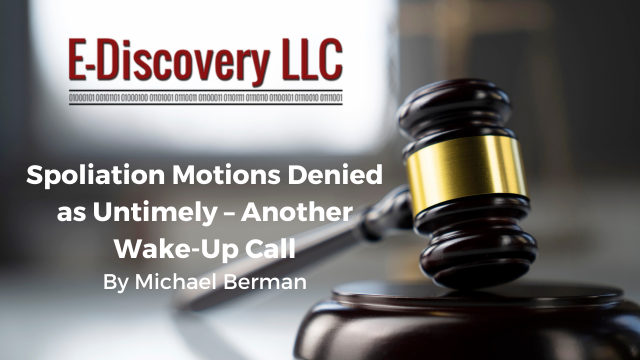
[EDRM Editor’s Note: The opinions and positions are those of Michael Berman.]
In CSX Transportation, Inc. v. Spiniello Global, Inc., 2023 WL 5515979 (D. Md. Aug. 25, 2023)(Bredar, C.J.), the Court denied spoliation motions, in part because they were filed too late.
The plaintiff owned and operated the coal shipment facility. Defendants included the City of Baltimore and “Spiniello,” a contractor. The dispute centered on CSX’s claim for $1.9 million in alleged remediation costs related to a discharge of sewage-contaminated water at a coal shipment facility. Remediation efforts included cleaning contaminated coal and equipment. The Court docket reports that the demand is for $2,297,000.
The Court first rejected defendants’ request to apply its inherent powers to this ESI sanctions request and, instead, explained and applied the elements of spoliation under Fed.R.Civ.P. 37(e). It noted that the movants sought only game-ending sanctions and did “not seek less harsh remedies more narrowly tailored to the alleged misconduct underlying these Motions.” Id. at *9.
After determining that that movants “wholly failed” to establish that the producing party “acted with intent to deprive,” as required for game-ending sanctions under Fed.R.Civ.P. 37(e)(2), the Court turned to the timeliness – or lack thereof – of the motions.
It wrote that:
“Defendants complain of the fact that [plaintiff] CSX represented during discovery that the SCADA data could not be found, but did not disclose at that time that the records had been deleted. Defendants explain that this deprived them of the opportunity to explore the details of the deletion during depositions or retain appropriate technology experts to ascertain whether it could be retrieved. This concern highlights the importance of promptly raising spoliation issues when they arise.”
Id. at *11 (cleaned up; emphasis added). The Court continued:
“As the emails cited above reflect, [defendant] Spiniello was aware of this issue as of the summer of 2021…, at which point the parties were in the midst of discovery. Yet, Defendants did not file the instant Motion until January of 2023, along with a slew of other Motions—several of which also sought the harsh remedy of dismissal—as well as Spiniello’s Motion for Summary Judgment. This is an issue that could have been sorted out during the discovery phase, rather than raised as grounds for dismissal more than a year after fact discovery had closed, and some eighteen months after Spiniello became aware of the issue. The Motion will be denied.”
Id. at *12 (emphasis added).
As to a second set of documents, the Court wrote that “the late timing of this [sanctions] Motion well after the close of discovery makes it difficult to determine what communications did in fact exist and whether [plaintiff] CSX’s efforts to find them were adequate…. Accordingly, the Motion will be denied.” Id. Judge Bredar cited Judge Grimm’s decision in Goodman v. Praxair Servs., Inc., 632 F.Supp.2d 494, 508 (D. Md. 2009).
The late filing of the sanctions motions appears inexplicable. Goodman was decided in 2009. As noted in When Should a Spoliation Motion Be Filed and Decided?, the questions of when a spoliation motion should be filed and decided were also addressed in this District by Eller v. Prince George’s Co. Public Schools, et al., 2020 WL 7336730 (D. Md. Dec. 14, 2020); Shackelford v. Vivint Solar Developer, LLC, 2020 WL 5203340 (D. Md. September 1, 2020); Brittney Gobble Photography, LLC v. Sinclair Broad. Grp., Inc., 2020 WL 1809191, at *3 (D. Md. Apr. 9, 2020); Sabah v. Agbodjogbe, 2019 WL 4447235, at *4 (D. Md. Sept. 17, 2019).
As noted in the 2020 blog, there are two general principles guiding the timing of filing and deciding spoliation motions.
First, prudence suggests prompt filing of such motions soon after learning of a basis for doing so.
Second, courts are likely to wait until a full record is developed before deciding the motion. See, e.g., M. Berman, et al., eds., “Electronically Stored Information in Maryland Courts” (Md. State Bar Ass’n. 2020), 229 (collecting cases).
In Eller, the Court implicitly determined that promptly pursuing “discovery about discovery” may toll the obligation to move for sanctions; however, it cautioned that, even in those circumstances, it would have been better to file a timely motion.
The Eller Court noted that Rule 37 does not contain a statute of limitations. However, courts consider a number of factors, such as “(1) how long after the close of discovery the relevant spoliation motion has been made; (2) the temporal proximity between a spoliation motion and motions for summary judgment; (3) whether the spoliation motion was made on the eve of trial; and (4) the explanation of the moving party as to why the motion was not filed earlier should be considered.”
To paraphrase the Hon. Andrew J. Peck (ret.), these decisions on the timing of raising spoliation issues “should serve as a wake-up call to the Bar in this District….” William A. Gross Const. Assocs., Inc. v. Am. Mfrs. Mut. Ins. Co., 256 F.R.D. 134, 134 (S.D.N.Y. 2009).


